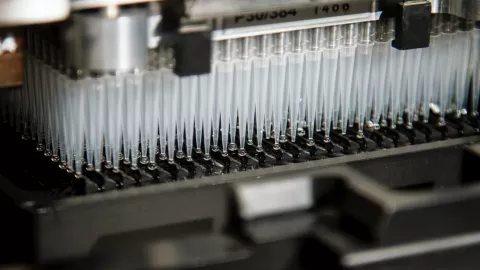
Under the microscope: what is the potential of BTK inhibitors?
Bruton’s tyrosine kinase (BTK) inhibitors are an emerging type of disease modifying therapy (DMT) for MS. They’re currently being tested in late-stage clinical trials for relapsing, primary and secondary progressive MS. We look at how they work differently from existing DMTs and what they could offer.
BTK inhibitors were first developed as cancer treatments in 2013. They're taken daily as a tablet. And they work by stopping a molecule called BTK from doing its job. Recently, several drugs companies have recognised their potential to treat MS.
Currently, there are BTK inhibitors undergoing phase 2 and phase 3 clinical trials across the world.
In MS, the immune system attacks the protective myelin coating around nerves. All current DMTs aim to stop rogue immune cells from attacking the myelin. This process is called immunomodulation.
BTK inhibitors are also immunomodulatory drugs. But they have distinct properties which allow them to do things most DMTs can’t.
Targeting immune cells more selectively
BTK inhibitors aim to stop immune cells called B cells from attacking myelin. This is similar to some existing DMTs such as ocrelizumab. But not all B cells are the same. So wiping them all out can make it more likely you’ll get rid of some useful B cells as well. This is one reason why current DMTs come with the risk of unpleasant or even dangerous side effects.
BTK inhibitors are more selective than the existing DMTs about which B cells they target. So they could potentially reduce the chance and severity of potential side effects compared to current DMTs.
Crossing the blood-brain barrier
The blood-brain barrier (BBB) is a border of cells that controls which molecules can enter the brain and spinal cord from the blood.
Crossing the BBB allows a drug to fight rogue immune cells at the exact location where those cells are attacking myelin. So it may be able to prevent myelin damage more effectively than DMTs that work outside the brain and spinal cord. This is one reason researchers think the existing DMT cladribine might help treat advanced progressive MS.
Most existing DMTs can’t cross the BBB. But researchers have found that BTK inhibitors can cross the BBB in mice, giving hope the same is possible for humans.
Managing microglia
Microglia are a type of immune cell found in the brain. Microglia have been linked to progression in MS. Researchers suspect a link between microglia and nerve cells dying. Like B cells, microglia also contain the BTK molecule. So BTK inhibitors can directly target microglia as well as B cells.
This is why the companies are testing BTK inhibitors in primary progressive MS and non-active secondary progressive MS, as well as relapsing MS. But, the role of microglia in MS progression is still not fully understood. So the potential for these drugs to slow progression should be treated with caution.
How close are we?
Four BTK inhibitor treatments are being investigated in several different phase 2 and phase 3 trials: tolebrutinib, evobrutinib, orelabrutinib, and fenebrutinib.
Previously, two phase 2 trials with evobrutinib and tolebrutinib looking at relapsing MS showed significant reduction in relapse rates and a reduction in new lesions on MRI scans.
The Phase 3 trials for tolebrutinib, evobrutinib and orelabrutinib have been placed on partial clinical hold by the the FDA (Food and Drug Administration, a US regulator). This means new participants can't be enrolled into the trial. And, people who had been taking the drug for 70 days or less have to stop.
In all the trials, this was because a small number of participants experienced liver injury. Their livers returned to normal when they stopped taking the drug.
The researchers will collect the data from everyone who has already joined to better understand how safe and effective these BTK inhibitors are for people with MS.



